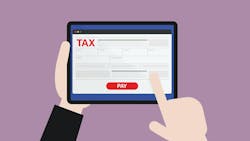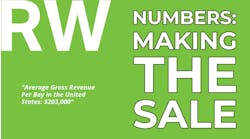For the vast majority of new automotive repair shop owners, fixing cars is the easy part of running a business. Preparing for tax season is not.
The name of the game, of course, is to take advantage of all available deductions and only pay the money you truly owe to the government. That requires plenty of planning and, ideally, a close partnership with a knowledgeable Certified Public Accountant (CPA).
“Most people who start a shop understandably have little to no background in financial compliance,” says Eric Joern, a partner with Kaizen CPAs & Advisors, a five-office practice in Illinois and Wisconsin that specializes in working with auto repair shops. “If you’re not careful, you could end up losing a lot of money."
“Every shop has very individual goals and needs that need to be taken into account when decisions are made,” adds Hunt Demarest, a senior accountant with Paar, Melis & Associates in Maryland with a similar focus. “You want to be proactive and avoid big surprises.”
Here are some of their top tips for owners:
Select the best tax structure.
Determining if your business should operate as an S corporation, Limited Liability Company (LLC), partnership, or sole proprietorship for tax purposes is a crucial but often-overlooked piece of planning.
In some cases, simply switching how the Internal Revenue Service views your business as a legal tax entity can result in significant savings.
And what works well for a small shop might not be the best answer for a larger one. If you begin as an LLC with a sole proprietor, for instance, once you pass an approximately $60,000 profit benchmark, you likely would benefit from tackling the paperwork to convert to S corporation tax status. Note: you will remain an LLC for banking and operational systems.
Avoid business decisions based solely on taxes.
“Ask yourself these questions: ‘Will this purchase or investment make me or my team more money, or make our lives easier and more efficient?’” Demarest advises. “If it makes business sense, don’t let taxes be what stops you.”
On the flip side, don’t make choices only because of taxes, either. If you need new equipment, purchase it. If you don’t, you shouldn’t buy anything just to score a write-off. Ditto for capital investments and physical expansions.
If you’re already planning on making an acquisition or doing an upgrade project soon, however, consider acting before the end of a tax year.
Plan ahead.
Many new shop owners make the mistake of waiting until year’s end to review their financial statements, which can lead to unexpected tax bills.
Instead, look at statements monthly and provide your accountant with six months of financials in the summer for a mid-year review. Use a separate bank account and credit card for all business transactions to capture everything that could qualify for a deduction.
By October or early November, submit the rest of your documents to date. “That will give you time to make decisions before the end of the tax year,” Joern says. “If you’ve had a strong year of profits, for example, you might opt to spend some money to mitigate your tax bill.”
After Jan. 1, turn in all financial information for the year as soon as possible. If your taxes are completed earlier and you owe more than expected, you won’t face a last-minute scramble. Finally, ask your accountant to help you develop a rough tax plan for the new year.
Always fund your retirement accounts.
While tax-saving strategies generally involve spending money, contributing to a Traditional IRA, Roth IRA or 401(k) amounts to getting a tax deduction for putting money in your own pocket.
Understand deduction rules for acquiring equipment.
Whether you pay cash-in-full for an item, sign a lease-to-own agreement, or obtain a bank loan with monthly payments, all count just like upfront cash for tax purposes, in whatever year you sign an agreement.
In other words, if you buy a Hunter Alignment Rack for $100,000 but don’t have enough cash on hand, you may decide to spread out the expense with $2,000 monthly payments. You can still write off the entire $100,000 in that year.
Purchasing shop vehicles. New and used vehicles are no longer considered differently for tax purposes. Instead, size matters: anything with a gross vehicle weight rating above 6,000 pounds qualifies for accelerated depreciation, meaning you can write off the entire purchase amount in the first year.
Unlike those bigger SUVs, pickup trucks, and vans, cars and small SUVs have a first-year write-off limit of $18,000, with the rest depreciated over five years.
Doing renovations. Work that improves your buildings or grounds but doesn’t expand existing square footage or acreage is defined as a Qualified Leasehold Improvement and again offers a one-time write-off opportunity.
That includes repaving parking lots, replacing flooring, roofing or siding, painting interior spaces, and renovating waiting rooms. Expansions, on the other hand, usually must be written off over a much longer period.
Follow state-specific sales tax and payroll deduction rules.
Charging the incorrect amount of sales tax or not remitting enough money back to the state can lead to large penalties.
So can errors involving payroll withholding, including late payments to the government, Joern notes: “The IRS takes that particularly seriously. It’s considered to be stealing.” Be sure to have a good payroll system in place before ever hiring your first employee.
Reward your team.
Salary bonuses, which are taxable, are not the only way to boost employee morale. You might reimburse technicians for tools that they buy, host staff parties, or send out gift cards, which are tax-deductible for you and not considered reportable income for recipients. Just be sure to do so before the last payroll of the year.



